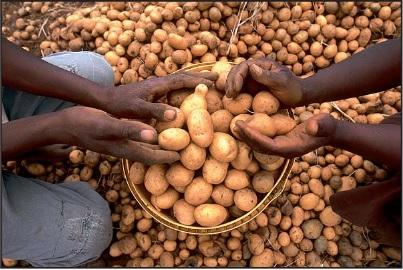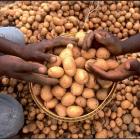
Das grüne Gold der Inkas [Big Spuds, Little Spuds]. Still.
Das grüne Gold der Inkas [Big Spuds, Little Spuds]. Still.
All rights reserved. © 1998 DokuFaktur Medienproduktion/Corves & Castineria GbR.
The copyright holder reserves, or holds for their own use, all the rights provided by copyright law, such as distribution, performance, and creation of derivative works.
Castiñeira, Delia and Christoph Corves. Das grüne Gold der Inkas [Big Spuds, Little Spuds]. Kiel: DokuFaktur Medienproduktion/Corves & Castineria GbR, 1998. BetaCam SP, 52 min.
Big Spuds, Little Spuds examines the impact of climate change and monoculture on one of the world’s staple food crops. It takes a close look at the potato to examine the effects of climate change and monoculture on one of the world’s staple food crops. With half the planet’s population dependent on rice, wheat, potatoes, and corn, to what extent are pests and disease—often exacerbated by climate change—threatening world food security? […] The film looks at traditional methods of potato farming where Andean families grow their own varieties, practice crop rotation, and utilize a minimum of inputs. In sharp contrast is the industrial method of production used in Idaho, and increasingly in Peru, where just a few high-yielding varieties are grown, where soil fertility decreases, pesticides lose their effectiveness, and campesinos wind up working as laborers on their own land. But there is a new pride in the old varieties of potatoes. People are documenting the characteristics of different varieties in an attempt to preserve genetic diversity, and with it perhaps world food security. (Source: Official Film Website)
© 1998 DokuFaktur Medienproduktion/Corves & Castineria GbR.
This film is available at the Rachel Carson Center Library (RCC, 4th floor, Leopoldstrasse 11a, 80802 Munich) for on-site viewing only. For more information, please contact library@rcc.lmu.de.
- Braa, Dean M. "The Great Potato Famine and the Transformation of Irish Peasant Society." Science & Society 61: 193–215.
- Francis, Charles A., et al. Alternatives to Monoculture: Sustainable Systems for US Crop Production. Taipei: ASPAC Food & Fertilizer Technology Center, 1989.
- Madison, Mark Glen."'Potatoes Made of Oil': Eugene and Howard Odum and the Origins and Limits of American Agroecology." Environment and History 3, no.2, Ecological Visionaries/Ecologised Visions (1997): 209–238. doi:10.3197/096734097779555881.
- McNeill, William H. “How the Potato Changed the World's History.” Social Research 66 (1999): 67–83.
- Soluri, John. "Campesinos and the Hidden History of Biodiversity." In: "New Environmental Histories of Latin America and the Caribbean," edited by Claudia Leal, José Augusto Pádua, and John Soluri. Special issue, RCC Perspectives 7 (2013): 67–72.


